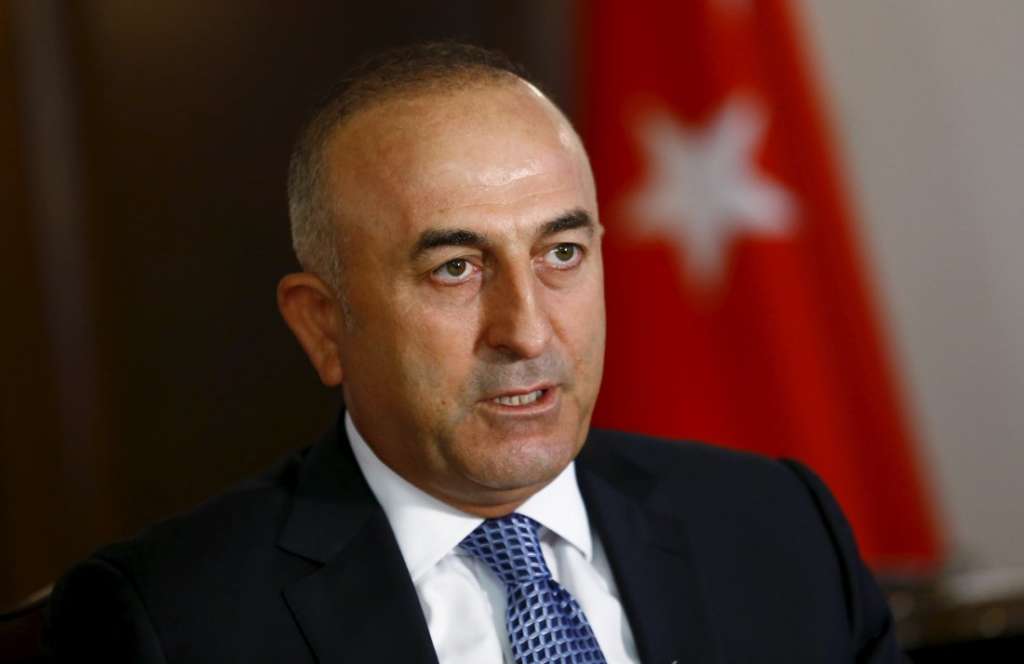Ankara – Turkish Foreign Minister Mevlut Cavusoglu said that Turkey’s relation with European countries is going through a difficult period, considering that the European Union’s actions let Ankara down following the failed coup attempt in July 15.
At the time when Turkish Minister confirmed that Turkey will take a positive initiative if Europeans do so, he also warned that his country will abandon the role it has taken in the Aegean Sea; referring to the possibility of returning refugees’ boats that were heading to Europe from Turkey if the EU did not adhere to its obligations mentioned in the migration agreement with Ankara.
Cavusoglu stressed that the upcoming referendum carried out in Turkey on constitutional changes for a new system of governance is part of the democratic process. He stated: “Whatever the result will be, Turkey will remain a strong, stable and democratic country and a reliable actor for its global partners.”
Q: How would Turkey look like after the referendum?
A: Turkey has a historical tradition for statehood and democracy. Our people have always stood up for their democratic rights, as we have seen last July when masses resisted coup plotters.
Turkish people have always shown resilience and devotion towards protecting their country, their democracy and their Republic. The upcoming referendum is about constitutional changes for a new system of governance.
The referendum is part of the democratic process and passes through parliament. Proposed changes, if accepted, will change the system of government. Whatever the result will be, Turkey will remain a strong, stable and democratic country and a reliable actor for its global partners.
Q: How will the referendum translate in terms of foreign policy?
A: The referendum is not about Turkish foreign policy. Turkey is an active member of NATO, G-20, OIC and almost all of the European institutions and adopts a multi-dimensional foreign policy. Turkey’s enterprising and humanitarian foreign policy addresses global as well as regional issues in a dynamic and principled manner.
Amidst many difficulties arising from conditions in neighboring states, Turkey remains playing a positive role. We uphold our international obligations and the rule of law. We ask our partners to do the same. Therefore, whatever the result of the referendum, Turkey will remain a bulwark for stability, peace and prosperity at home and in the world.
Q: Given current tensions, what is to become of European-Turkish relations?
A: Our relations are going through a difficult period. The attitude of the EU and some European countries has been a great disappointment. Instead of receiving solidarity and support, Turkey has faced unfair criticism concerning measures it took in the aftermath of the aborted coup.
Furthermore, some European countries have saved no effort in presenting difficulties that would keep Turkish Ministers and deputies from meeting with their own citizens, while PKK and affiliated groups are permitted to demonstrate and display their symbols freely. This is a clear example of having double standards.
It is also disappointing for us to see that Turkey very often becomes an issue in domestic politics of some European countries, particularly during election campaigns. Issues related to Turkey appear in some European media on a daily basis and predominantly from a very negative point of view.
Political obstacles in the way of our EU accession process are another factor, which causes difficulties in European-Turkish relations. EU membership remains a priority for us.
Our relations with the EU, dating back to the Association Agreement of 1963, are established on a number of central axes such as the Customs Union and accession negotiations. Also, Turkey and the EU should cooperate against common challenges such as the migration crisis and the threat of terrorism.
However, there is a loss of trust towards the EU in Turkey, stemming from the EU’s latest attitude. We still are expecting positive concrete steps to overcome the confidence crisis.
Within this framework, we expect the blockages to be lifted, visa liberalization to be granted and all other commitments that the EU had made to be met.
Despite these difficulties, possibilities do exist to bring our relations back on a positive track. Turkey will certainly reciprocate if it is met with good intentions, as well as positive and constructive approach from European partners and the EU.
Further improvement to the Customs Union presents a vital opportunity to advancing our relations with the EU. This process will be in the interest of both sides and should not be blocked by political hindrances and shortsighted goals of domestic politics.
The EU is now in a process of self-review and integration of cultures and civilizations. This process could also be utilized for self-criticism and reform with a view to becoming a stronger entity in world politics. Turkey, as a reliable partner, is ready to contribute to this process.
Q: What are the provisions, or outlines, defining the migrant (refugee) deal you will present to the European Union?
A: The 18 March Agreement which has been a success story in the fight against irregular migration is functional due to Turkey’s tremendous efforts. Among others, visa liberalization for Turkish citizens was one of the commitments by the EU to be addressed in 2016.
We’ve been under the visa liberalization process since 2013 and we fulfilled almost all conditional benchmarks. This was acknowledged by the European Commission in its report dated May 2016.
However, we see no will on the EU side to move forward on this issue as it is also the case for other commitments it made.
We have prepared a work plan about preparations being taken for remaining benchmarks. We will present this plan to the EU which will in turn constitute Turkey’s final proposal in order to complete the visa liberalization process. We expect visa liberalization to be granted at the earliest.
If the EU does not give its green light on this issue, we will be obliged to review the heavy burden we assumed in the Aegean Sea.
